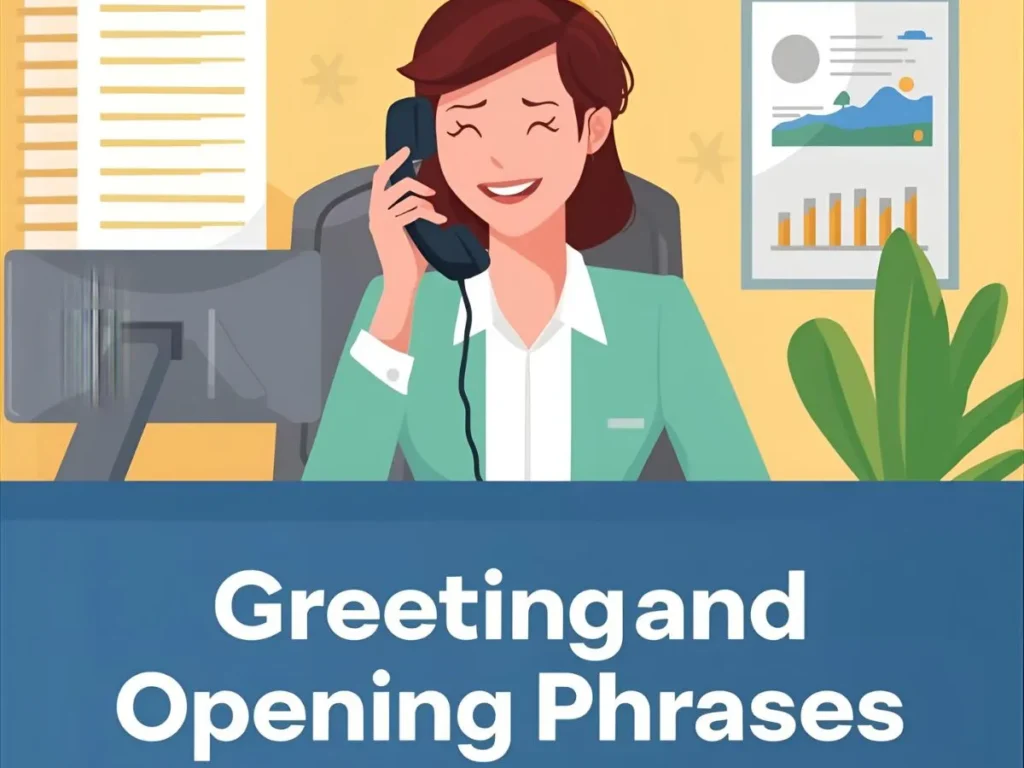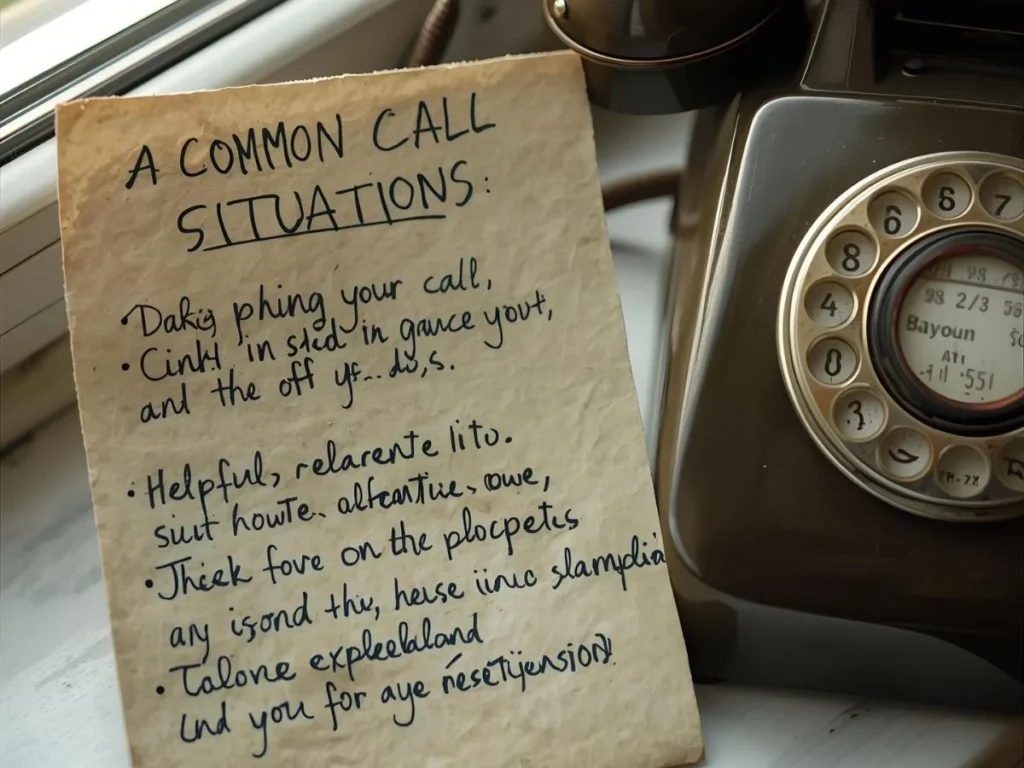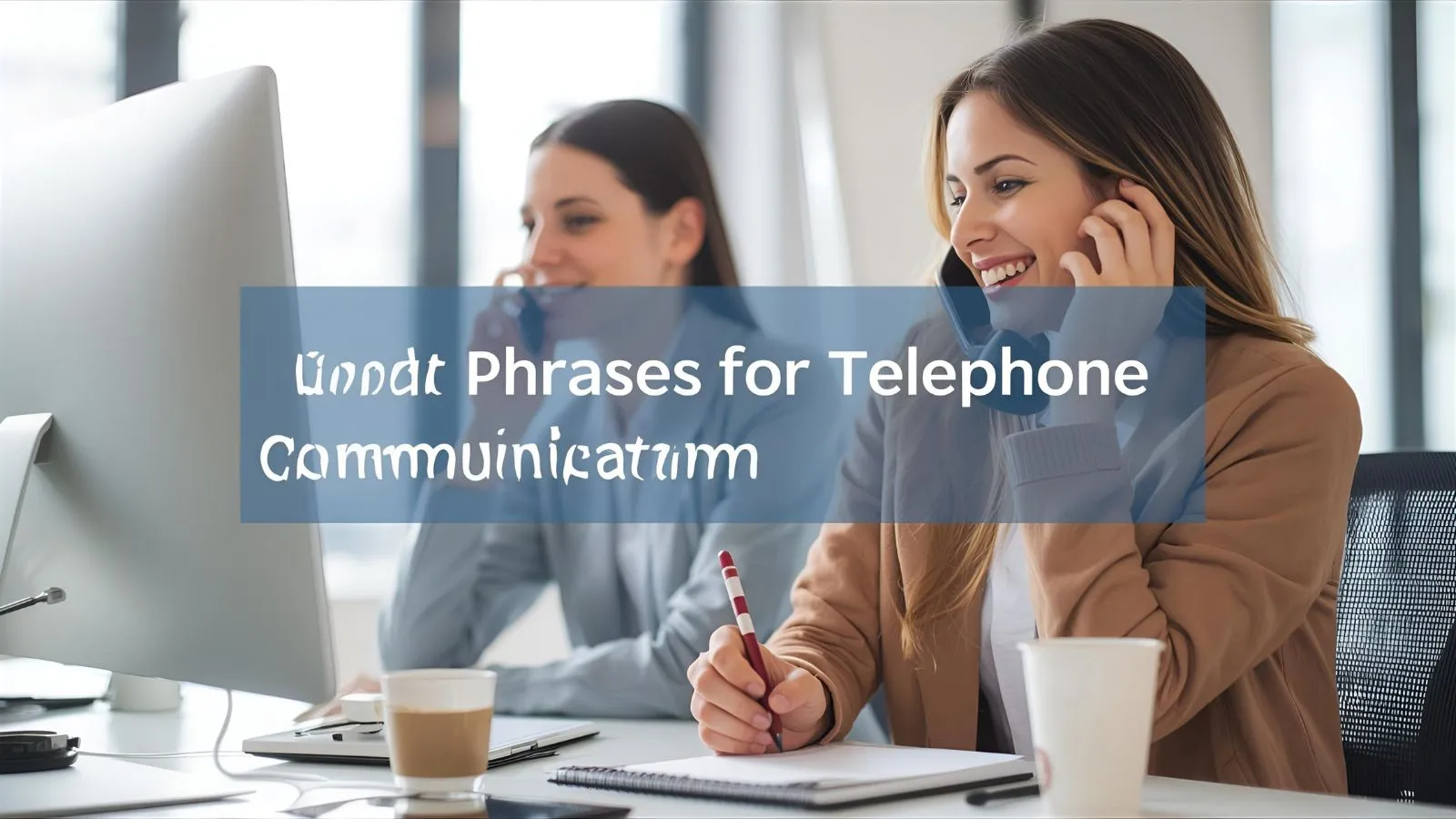Ever picked up the phone and felt unsure what to say next? You’re not alone! Using good phrases for telephone conversations is a skill that can make you sound more professional, friendly, and confident.
If you’re taking a customer call, making a business inquiry, or just chatting with a friend, knowing the right phrases helps keep the conversation smooth and pleasant.
In today’s fast-paced world, phone communication is still one of the most direct and personal ways to connect.
The right words can help you build trust, avoid misunderstandings, and leave a positive impression. In this article, we’ll explore the most useful and polite telephone phrases — from greetings to closing — complete with real examples and “Use When” tips.
Let’s dive into the world of good telephone communication and make every call sound natural and confident! 📞
Why Good Phrases for Telephone Matter 💬
Phone calls are a core part of both personal and professional life. A single phrase can change how people perceive your attitude and professionalism.
Using good telephone phrases helps in many ways:
- Clarity: The listener understands you better.
- Politeness: You sound respectful and attentive.
- Confidence: You come across as capable and in control.
- Efficiency: Calls are smoother and shorter when you know what to say.
Real-world example:
Imagine calling customer support. One representative says, “Hold on,” while another says, “Could I please place you on hold for a moment while I check that information for you?”
The second one instantly sounds more respectful and professional — that’s the magic of good phrasing!
Now, let’s explore the best telephone phrases by category 👇
1️⃣ Greeting and Opening Phrases

A good start sets the tone for the entire conversation.
1. “Good morning/afternoon! This is [Your Name] speaking.”
Use When: You’re introducing yourself in a formal or business call.
Example: “Good afternoon! This is Ali from BrightTech Solutions speaking.”
2. “How may I help you today?”
Use When: You’re answering a customer or client call.
Example: “Thank you for calling City Bank. How may I help you today?”
3. “Could I speak to [Person’s Name], please?”
Use When: You’re calling to reach someone specific.
Example: “Hello, could I speak to Mr. Ahmed, please?”
4. “I’m calling regarding…”
Use When: You need to explain the purpose of your call.
Example: “I’m calling regarding your recent inquiry about our services.”
5. “Is this a good time to talk?”
Use When: You want to be polite and considerate of the other person’s schedule.
Example: “Hi Sara, is this a good time to talk, or should I call back later?”
2️⃣ Putting Someone on Hold or Transferring Calls 📲

Sometimes, you need to pause the conversation. Doing it politely matters!
1. “May I place you on hold for a moment?”
Use When: You need to check information or talk to a colleague.
Example: “May I place you on hold for a moment while I find your file?”
2. “Thank you for holding.”
Use When: You return to the caller after a short hold.
Example: “Thank you for holding, Mr. Khan. I have the details you asked for.”
3. “I’ll transfer your call to the concerned department.”
Use When: The caller needs to talk to someone else.
Example: “I’ll transfer your call to our billing department right away.”
4. “Could you please hold while I connect you?”
Use When: You’re moving the caller to another line.
Example: “Could you please hold while I connect you to the technical team?”
5. “I’m afraid the line is busy right now.”
Use When: The person they want is unavailable.
Example: “I’m afraid the manager is busy right now. Would you like to leave a message?”
3️⃣ Asking for Clarification or Repetition 🔁
Sometimes, the line isn’t clear, or you missed something. Use polite phrases to ask again.
1. “I’m sorry, could you repeat that, please?”
Use When: You didn’t hear or understand the information.
Example: “I’m sorry, could you repeat that last part, please?”
2. “Would you mind spelling that for me?”
Use When: You’re unsure about the spelling of a name or address.
Example: “Could you please spell your last name for me?”
3. “Let me make sure I’ve got that right.”
Use When: You want to confirm details.
Example: “Let me make sure I’ve got that right — you said 25th October, correct?”
4. “Could you speak a little slower, please?”
Use When: The caller is speaking too fast.
Example: “I’m sorry, could you speak a little slower, please?”
5. “I’m afraid the line isn’t very clear.”
Use When: The connection is bad.
Example: “I’m afraid the line isn’t very clear. Could you please repeat that?”
4️⃣ Taking and Leaving Messages 📝

If someone isn’t available, you may need to leave or take a message.
1. “Would you like to leave a message?”
Use When: The person the caller wants isn’t there.
Example: “Mr. Ali is out of the office right now. Would you like to leave a message?”
2. “Can I take a message for you?”
Use When: You want to assist politely.
Example: “Can I take a message for you while she’s away?”
3. “I’ll make sure they get your message.”
Use When: You’re assuring the caller.
Example: “I’ll make sure Mr. Faisal gets your message as soon as possible.”
4. “Could you ask them to call me back?”
Use When: You’re leaving a message.
Example: “Could you please ask her to call me back when she’s available?”
5. “May I have your contact number, please?”
Use When: You need to collect callback details.
Example: “May I have your contact number so we can reach you later?”
5️⃣ Handling Difficult or Angry Callers 😡
It’s not always easy, but staying calm and polite helps.
1. “I understand how frustrating that must be.”
Use When: The caller is upset.
Example: “I understand how frustrating that must be. Let me see how I can help.”
2. “I’m sorry for the inconvenience.”
Use When: You need to apologize professionally.
Example: “I’m truly sorry for the inconvenience you’ve experienced.”
3. “Let’s work together to find a solution.”
Use When: You want to sound cooperative.
Example: “Let’s work together to find a quick solution for your issue.”
4. “Could you please explain the problem in more detail?”
Use When: You need to understand the issue better.
Example: “Could you please explain what happened when you tried to log in?”
5. “Thank you for your patience.”
Use When: The caller has waited or been calm.
Example: “Thank you for your patience while I check that for you.”
6️⃣ Closing the Call Politely 🔚
How you end the call leaves a lasting impression.
1. “Is there anything else I can help you with?”
Use When: You’re wrapping up customer calls.
Example: “Is there anything else I can help you with before we end the call?”
2. “Thank you for calling.”
Use When: You want to sound grateful.
Example: “Thank you for calling XYZ Services. Have a great day!”
3. “Have a nice day!”
Use When: Ending informal or friendly calls.
Example: “It was lovely talking to you. Have a nice day!”
4. “I’ll follow up with you soon.”
Use When: You plan to contact the caller later.
Example: “I’ll follow up with you by Friday with an update.”
5. “Goodbye and thank you for your time.”
Use When: Ending formal or business calls.
Example: “Goodbye, Mr. Khan, and thank you for your time today.”
7️⃣ Phrases for Common Call Situations 📞

1. When you didn’t reach the person:
- “I tried calling earlier but couldn’t reach you.”
- “I think we got disconnected.”
Use When: The call dropped or went unanswered.
2. When you need to reschedule:
- “Can we reschedule our call for tomorrow?”
- “Would next week be a better time?”
Use When: You can’t talk right now.
3. When confirming appointments:
- “I’m just calling to confirm our meeting tomorrow at 10 AM.”
Use When: You need to double-check details.
4. When giving or receiving updates:
- “I just wanted to give you a quick update on your request.”
- “Thanks for keeping me posted.”
Final Thoughts 💡
Using good phrases for telephone conversations can completely transform how you communicate.
If you’re talking to a customer, colleague, or friend, being polite, clear, and confident helps you create a positive impression.
Remember:
- Start with a friendly greeting.
- Be polite when asking questions or clarifying.
- Stay calm even in tough calls.
- End every call on a warm note.
With a little practice, these phrases will become natural. Every phone call is a chance to build trust and connection — so speak with warmth and professionalism, and let your words work for you! 📱
Bonus Recap Table 📋
| Category | Key Phrases | Example Use |
|---|---|---|
| Greetings | “Good morning, this is [Name].” | “Good afternoon! This is Ayesha speaking.” |
| Hold & Transfer | “May I place you on hold?” | “Please hold while I connect you.” |
| Clarification | “Could you repeat that, please?” | “I’m sorry, could you speak a little slower?” |
| Messages | “Would you like to leave a message?” | “I’ll make sure he gets your message.” |
| Difficult Callers | “I understand how frustrating that must be.” | “Let’s work together to find a solution.” |
| Closing | “Thank you for calling.” | “Have a nice day!” |

At QuickReply.com, speed meets smart communication! Instantly craft perfect replies, boost engagement, and save time. Your go-to hub for quick, witty, and professional message responses anytime!

Leave a Reply